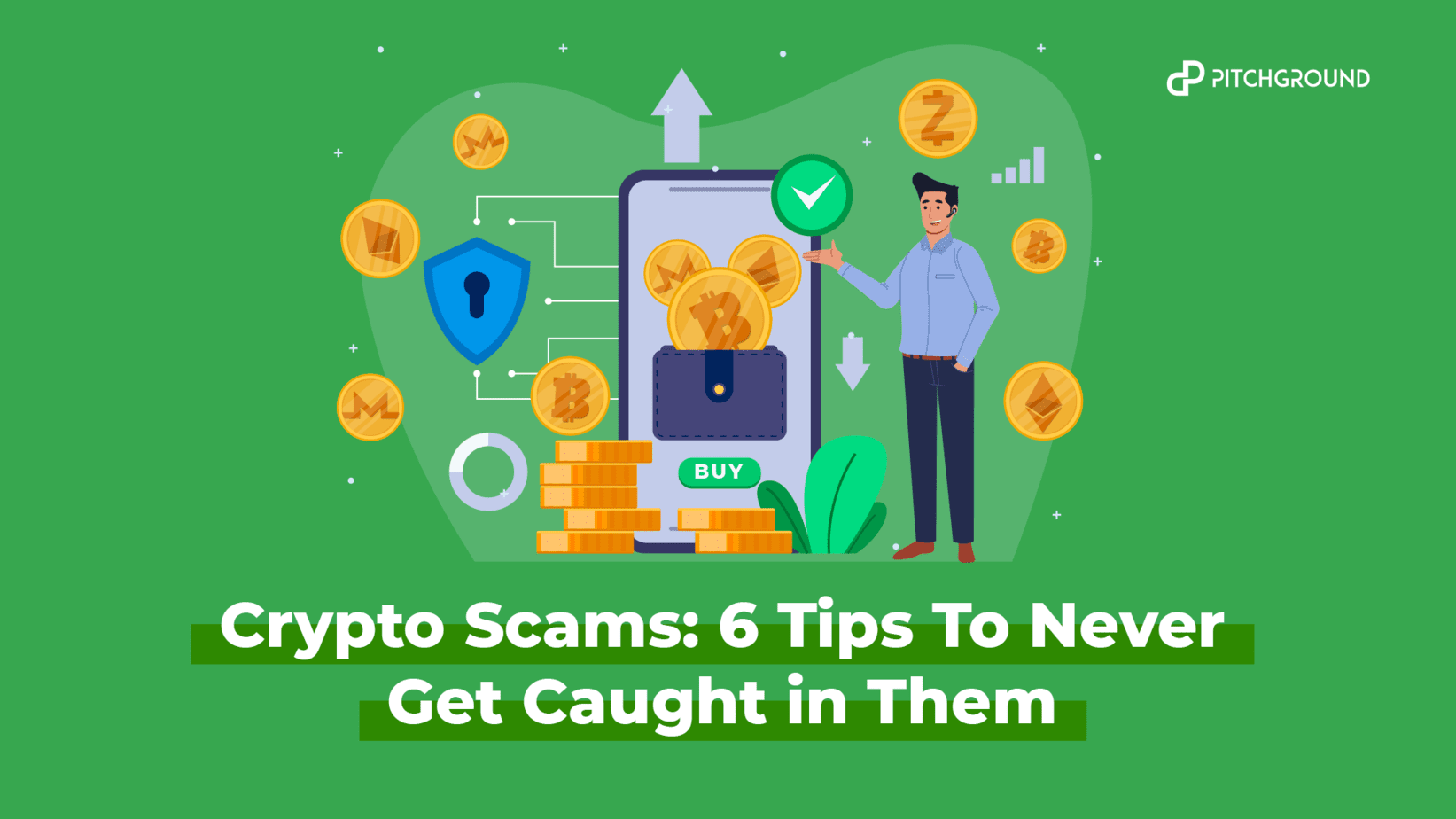Cryptocurrencies are hot right now. They’ve got everyone talking and investing. But with such a high profile comes a lot of hype and a lot of fraud.
There are many scammers who are trying to make quick bucks from unsuspecting investors. In this guide, I’ll teach you how to identify these scams and protect yourself from being scammed.
I’ll also share my top tips for avoiding crypto scams.
Statistics
- In the U.S., almost 7,000 people lost upwards of $80 million in crypto scams from October 2020 through March 2021, according to the Federal Trade Commission (FTC), based on scam reports filed in the U.S. (time.com)
- A company or individual may say they have a once-in-a-lifetime opportunity to invest in a new form of crypto with guaranteed 1,000% returns. (time.com)
- Financial experts advise most passive investors to keep crypto holdings to under 5% of their portfolios, and never to invest in crypto at the expense of saving for emergencies or paying off high-interest debt. (time.com)
- About 20% of the money people reported losing through romance scams since October 2020 was sent in cryptocurrency, and many of these reports were from people who said they thought they were investing. (ftc.gov)
- Since October 2020, people ages 20 to 49 were over five times more likely to report losing money on cryptocurrency investment scams than older age groups. (ftc.gov)
- In contrast, people 50 and older were far less likely to report losing money on cryptocurrency investment scams. (ftc.gov)
What to Know About CryptoCurrency
Cryptocurrencies are digital currencies that use cryptography for security. The term cryptocurrency is a portmanteau of “cryptography” and “currency,” which was first used in 2008 by an anonymous developer who published the Bitcoin white paper. (wikipedia.org)
The value of cryptocurrencies can fluctuate significantly. For example, one day it might be worth $100, the next day $200, then back down to $50 and so on. This makes them very risky investments.
Cryptocurrency exchanges allow users to buy, sell, trade, and store different types of coins.
There are thousands of different cryptocurrencies available today. Some are made specifically for trading; others are designed as a means of payment. Most cryptocurrencies can be traded against other cryptocurrencies, fiat currency, or precious metals. (investopedia.com)
Cryptocurrencies are considered decentralized because there is no central authority controlling them.
Instead, transactions are verified and recorded on a public ledger called the blockchain. (investopedia)
Bitcoin is the first and largest cryptocurrency. It’s also known as BTC, BCH, XBT, or simply bitcoin. Bitcoin has been around since 2009 and was created by Satoshi Nakamoto. (bitcoin.org)
Crypto Scams: How to Spot Them
The crypto world is a fascinating place. It’s filled with people who are passionate about technology and its potential, but it can also be an easy target for scammers looking to take advantage of that passion.
There are several ways crypto scams happen. Scammers might ask you to send funds through a third party or even threaten you with legal action.
However, the most common method is by using what’s known as an “ICO” – Initial Coin Offering.
Here we will show you how these work and how you can avoid falling prey to them.

What Is An ICO?
An initial coin offering (ICO) is when a company offers its cryptocurrency in exchange for another currency or other assets.
For example, let’s say I wanted to start my very own hotel chain. I could offer you one token for every $100 you spend on each room we have at our hotels.
You would receive your tokens upon check-in. This way, both parties benefit: I get to keep all the profits while you get access to discounted rooms.
This practice was first used by startups raising capital back in 2013. Since then, it has become more widespread—companies worldwide have started their coins and raised millions of dollars from investors.
It also became apparent that many companies were only looking out for themselves and didn’t care about their users.
In 2017, there was a scandal when it came out that some companies had offered free coins to social media influencers or paid celebrities to promote their products.
At the same time, regulators began to take notice. In 2018, Facebook announced that it would ban ads promoting cryptocurrencies and specific binary options platforms.
In general, ICOs are unregulated investments. It means anyone can invest in any project.
As long as the project itself doesn’t break any laws, the investor should be fine.
However, this does not mean that all ICOs are legitimate.
Some projects use blockchain technology as a marketing tool to raise funds without actually having anything new.
Others take advantage of people’s eagerness to invest in something new and promising. And others disappear before releasing a single product.
How Can These Projects Disappear?
Unfortunately, it is impossible to know if an ICO is legitimate until after. There are no regulations or guidelines in place to protect potential investors.
That being said, here are some red flags that may indicate a scam:
- When you visit a website, you want to feel like reading a magazine article rather than clicking on a link.
- The website looks unprofessional. A professional site looks polished, unambiguous, and concise.
- The website contains grammatical errors. If you see spelling mistakes, incomplete sentences, or poor grammar, the chances are that the person who created the website isn’t fluent in English.
- The website uses terms such as “blockchain,” “bitcoin,” “ICO,” or “token sale.” While these words may sound technical, they don’t necessarily mean that the project is legit. Be suspicious if the website uses these buzzwords but fails to explain precisely what they mean.
- There are no reviews. If a site lacks any reviews, it probably isn’t legitimate. It is hard enough getting someone to write a review for a restaurant; why would they do so for a random online business?
- There are no links to official websites. The most reputable sites will point visitors to their websites to learn more about the industry and the project.
- You can’t send money anywhere. No legitimate business accepts payment via wire transfers. If a site asks you to wire payments, run away immediately.
- The website claims that it is based in another country. Legitimate businesses are permanently based in one specific location. They aren’t scattered across multiple nations like scammers often are.
- The website doesn’t provide contact information. If a company wants your email address, it is likely a scam. Legitimate businesses usually ask for emails because they want to communicate with customers.
- The website doesn’t offer refunds. If the website says that it gives refunds, it is almost certainly a scam. Scams rarely give refunds even if they say they will.
- When visiting a website, please pay attention to how easy it is to get in touch with them. Can you reach them through phone calls, live chat, or email? How quickly can they respond? Are there other ways to contact (such as social media)?
What Should You Do If You Invested in One of These Projects?

If you invested in a fraudulent ICO you’re very well in crypto scams and could lose everything. Here are three things you can do if you were duped into investing:
1.Don’t panic.
First, try contacting the team again to find out whether you can get your money back.
Second, check the terms of the investment contract carefully. Sometimes, companies promise returns that are too good to be true.
Third, make sure that all the agreement details are spelled out clearly.
Fourth, talk to your lawyer. They should be able to help you figure out what recourse you have.
Finally, consider talking to the police. Some people claim that they lost thousands of dollars when they fell victim to an ICO scam (crypto scams).
In some cases, this is true. However, in many cases, the victims couldn’t prove that they had been defrauded.
For example, they might not have kept copies of all their communications with the scammers.
In those cases, the police wouldn’t be able to help them recover their losses.
2. Get your documents in order.
After you convince yourself that the deal was a part of crypto scams, take steps to protect yourself from future fraud.
Make sure that you keep records of all transactions related to the scheme.
It includes bank statements, canceled checks, receipts, and anything else that proves that you paid money to the organization.
Also, don’t forget to save any emails associated with the crypto scams.
3. File a complaint.
If you think a scammer has stolen your investment, you need to report the case.
The Securities Exchange Commission has a website where investors can file complaints against fraudulent organizations.
It also provides tips on spotting crypto scams.
How Can You Avoid Getting Caught Up in an ICO Scam?
Several simple hacks can help you avoid falling for a crypto scam.
1. Be wary of websites that look sketchy.
The best way to tell whether a site is legitimate is to look at its domain name.
A real business will use.com,.org or another TLD. Scammers often set up sites using.io domains.
2. Never send funds without verifying the person’s identity who requests them.
It is probably a scam if someone asks you to transfer money via email or text message. Instead, ask for more information about the project.
If the request seems suspicious, contact the person directly.
3. Only invest money that you can afford to lose.
People sometimes fall prey to ICO scams because they lack the financial resources to withstand the loss.
Before parting with any money, make sure that you have enough capital to cover the project’s cost.
4. Look for third-party reviews of projects before investing.
A reputable company like Glassdoor will give you additional insight into the nature of a particular project. Reviews will help you tell apart from authentic crypto and crypto scams.
5. Read the fine print.
Many cryptocurrency exchanges require users to sign contracts that include arbitration clauses.
These clauses allow the exchange to decide disputes between members. They may also contain class action waivers.
Arbitration clauses usually allow only one individual to sue. Class actions involve lawsuits filed on behalf of a large group of individuals.
Moreover, class action waivers prevent you from filing a lawsuit if you discover that the other party committed fraud.
6. Consider investing through regulated platforms.
Regulated exchanges like Coinbase and Gemini offer much safer ways of buying cryptocurrencies.
7. Beware of high-interest rates.
If a company promises you huge profits, it could just be trying to trick you into paying exorbitant fees.
Always compare the interest rate of a given project to similar investments.
8. Watch out for fake social media accounts.
Hackers sometimes create fake profiles to lure unsuspecting investors. They might even try to impersonate well-known people.
9. Don’t pay for access to pre-ICO tokens.
In most cases, these tokens aren’t worth the price charged. Some scammers sell them anyway.
10. Check the reputation of the team behind a project.
If a project doesn’t have a track record, it is not guaranteed to be trustworthy. Conduct some research on the background of the founding team.
Avoiding Crypto Scams: How to Spot a Fake Project
Many people fall victim to crypto scams simply because they don’t know how to spot a fake project. Fortunately, several simple strategies can help you identify fakes.
Ask Questions.
Most legitimate crypto startups should provide answers to basic questions about their products.
For example, ask about the types of services offered, the amount of funding needed, and what kind of ROI (return on investment) you can expect.
Use Google.
Search the Internet for reviews of the project. Review sites such as Glassdoor and Trustpilot often post detailed product reviews.
You can find many valuable articles by typing in ‘project name + review.’
Do your Homework.
Find out whether the token has been traded on an exchange. Also, check its market cap. The higher the market cap, the more likely the coin is genuine.
Use Multiple Sources.
It isn’t wise to rely solely on one source of information.
For example, it would not be brilliant to trust only CoinMarketCap when looking at the price of Bitcoin Cash.
Verify Data.
If you see something suspicious, dig deeper. Is there any evidence that the project is actual? Has it ever been hacked or shut down?
Avoid Dodgy Websites.
Be cautious of websites with unprofessional design or content.
There are plenty of shady websites out there that look professional but ultimately serve fraudulent purposes.
How To Invest Safely And Get Maximum Returns From Cryptocurrencies

We now live in the age of digital currencies. This new form of money offers unprecedented opportunities for both consumers and businesses.
However, it comes with significant risks. One of the biggest dangers lies within cryptocurrency scams.
These schemes promise high returns on investments in return for little effort. Unfortunately, this type of scam is not uncommon.
To avoid falling prey to a cryptocurrency scam, here are some tips that will help you invest safely while getting rich from cryptocurrencies.
1. Research before investing.
Before buying a particular cryptocurrency, make sure it meets all of your requirements.
Are there enough exchanges where you can trade it? Does it have enough liquidity? Will you need to pay fees to use it?
2. Know who owns a token.
Look up the owner of a token on various online platforms. If the person hasn’t disclosed his identity, you may want to steer clear.
3. Understand the technology.
Understanding the underlying technology of a particular token may give you insights into its future value.
For instance, if you understand the blockchain technology that underpins Bitcoin, you might better predict which altcoins will succeed and which will fail.
3. Check the project’s website.
A good indicator of whether a project is legit is the quality of the website itself.
Look for a clean layout, responsive design, and easy-to-read text. Don’t forget to check the domain.
If it sounds too good to be true, it probably is.
4. Beware of pump and dump groups.
Pump and dump groups operate in a similar way to Ponzi Schemes. They encourage investors to purchase tokens using low prices.
Once the price increases, these groups sell their holdings at much higher rates.
5. Never invest more than you can afford to lose.
It is essential to set aside funds for losses. It should never exceed 10% of your total investment.
6. Always do your research.
Keep abreast of news regarding crypto projects. Read up on what others think about them.
You could also join forums or chatrooms related to specific coins. Doing so will allow you to stay informed about developments around the industry.
Consider moving your assets to exchange. Exchanges like Coinbase offer safe ways to store your cryptocurrencies. Most importantly, they provide insurance against theft.
7. Use a multi-signature wallet.
Multi-signature wallets require multiple people to sign off on transactions. If one key holder loses access to his private keys, the entire amount remains secure.
8. Diversify your portfolio.
Even though diversification is the best way to reduce risk, it doesn’t mean that you shouldn’t invest in any cryptos.
Some experts suggest that you create a separate account just for trading.
9. Avoid ICOs.
Initial coin offerings (ICOs) are unregulated, unlicensed fundraising events. Many scammers see ICOs as a quick route to riches.
Once a project has raised funds through an ICO, they no longer need to follow regulations. They can disappear overnight without warning.
10. Invest wisely.
Remember HODL!
Conclusion:
Governments don’t regulate cryptocurrencies. That means that you take some risks when investing in them.
However, you can minimize those risks if you know how to spot scammy ICOs and avoid getting caught up in pump and dumps.
Cryptocurrency is still new, but it’s already changing our lives and you need to be on the alert side of the crowd.
Use these tips to steer clear from crypto scams.
Invest Wisely and Stay Safe!
